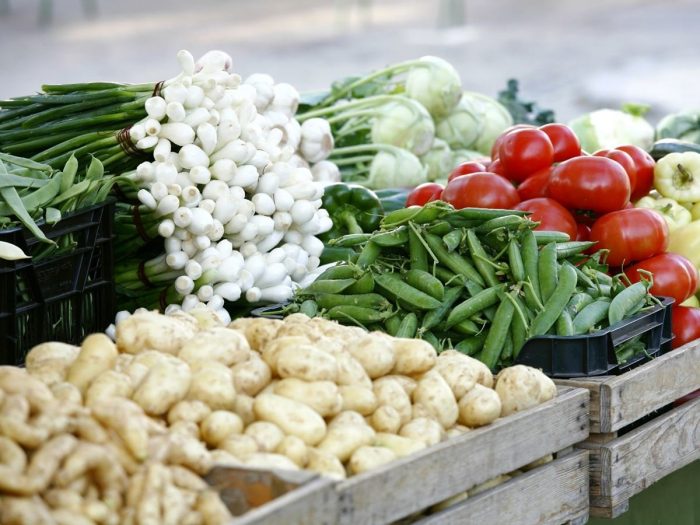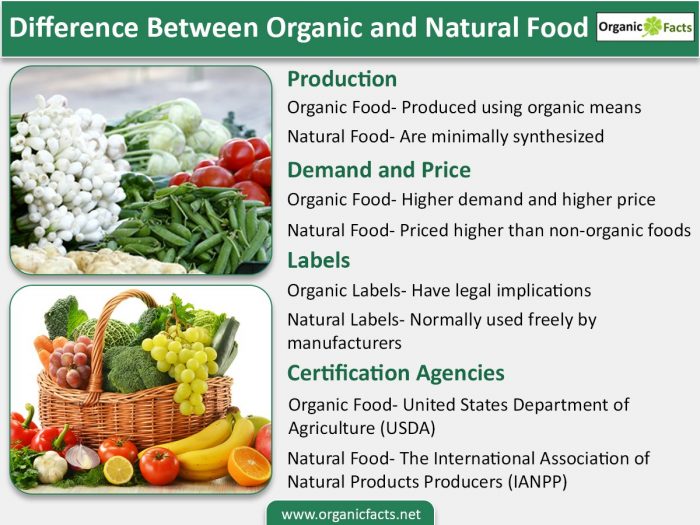People usually think that there is no difference between natural and organic food and that both mean the same. However, this is not true. If you compare organic and natural from their definitions, the difference will be quite clear.
Organic food refers to the food items that are produced, manufactured, and handled using organic methods defined by certifying bodies such as the United States Department of Agriculture (USDA) under its Organic Food Products Act. Natural food, on the other hand, generally refers to food items that are not altered chemically or synthesized in any form. These are derived from plants and animals. Thus a natural food item is not necessarily organic and vice versa. [1]
But the important question is – “Why do some people prefer organic food and some prefer natural food?” This is because some people have the belief that synthesizing a food item results in some level of loss of its nutrients and beneficial properties. Therefore, they demand natural food.
Apparently, the demand for organic food is more than natural food because organic food seals are guaranteed and monitored by the government. An act similar to the Organic Food Products Act is necessary for natural food products as well, but it has not been made till now.
What is Organic Food?
Organic food refers to items that are produced using fewer artificial but beneficial means. Stringent standards for organic food production, handling, and processing exist throughout the world.
What is Natural Food?
Items are minimally synthesized. Stringent standards do not exist for natural food products in many parts of the world.
Difference Between Organic & Natural Food
Certification Agencies
- Organic food: Many countries have certification bodies, the most prominent being the United States Department of Agriculture (USDA).
- Natural food: The International Association of Natural Products Producers (IANPP) is trying to get the definitions for natural food into a reliable and credible place. It should be noted that this association is not a certification body.

Organic veg market is the largest and fastest growing segment of the organic food market. Photo Credit: Shutterstock
Food Labels
- Organic food: Organic labels have legal implications. A manufacturer must follow the specified rules and regulations before using the organic label.
- Natural food: Natural labels are normally used freely by manufacturers due to lack of adequate guidelines.
Food Demand
- Organic food: There is considerably more for organic food than for natural food. Organic food is readily available all over the world and people buy it more and more every year.
- Natural food: The demand is increasing, but not nearly as much as for organic food.
Health Benefits
- Organic Food: There is no evidence to prove that organic food is healthier than non-organic food. People prefer organic food because they feel that it is safer than conventional food as chemicals are not used in its production. However, recent research on the health benefits of organic milk has boosted the spirits of organic food lovers. Recent research suggests that [2]choosing organic food can lead to increased intake of nutritionally desirable antioxidants and reduced exposure to toxic heavy metals.
- Natural Food: People prefer this type of food because they believe excessive processing of food items disturbs the implicit health benefits.
Food Price
- Organic Food: It is priced higher than non-organic food.
Natural Food: It is priced higher than processed food.

This is how organic food differs from natural food. Photo Credit: Shutterstock
Shelf Life
- Organic Food: The shelf life of organic food is more than that of natural food, implying that you can store it safely for a longer duration.
- Natural Food: Since it is minimally processed, many food items which have a high water content have a subsequently shorter shelf life.
Availability
- Organic food: Organic food is being sold in almost every major supermarket. There are even specialty stores selling organic food exclusively and one can purchase organic food online as well.
- Natural food: It is available at many stores that sell organic food. Furthermore, many stores selling health food items also sell natural food products. It is a vastly growing market.
